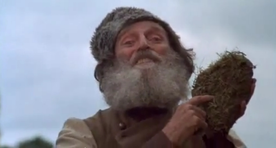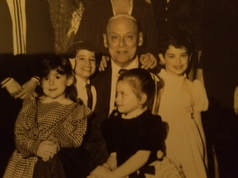weekly column
|
Each week, find a commentary on something connected to verses of Torah or another source of wisdom
|
|
Each week, find a commentary on something connected to verses of Torah or another source of wisdom
|
 The Exodus:5 Project On the sixth day, when they apportion what they have brought in, it shall prove to be double the amount they gather each day. Exodus 16:5 Like a lot of America, I appear to be suddenly wealthy. My various investments are benefiting from the surge in the stock market, and even a life-long market coward like me finds my few remaining bar mitzvah stocks and retirement accounts surging. I saw a story in the newspaper the other day about people my age who are withdrawing some of this unanticipated money from their 401K savings to take vacations or buy another house or live a little larger while they feel up to it. Not me. I remember not so many years ago when acquaintances who were then the age I am now were running around with their hair on fire because these same accounts were suddenly underperforming. They believed that their future would include cat food and heavy blankets as their retirement years became the dystopian version of their earlier dreams. I am not planning on abundance or deprivation, just the sabbath of my work-life. There are a lot of Biblical stories that we treat like fairy tales, especially when reading them with principled literalism provokes deep disbelief in the likelihood of their truth. It does not matter to me at all if manna fell from the skies six nights a week as the Israelites spent a generation or more wandering around the wilderness like flies in a mason jar. Let’s say it did, or let’s say it didn’t. Here we are to debate it; therefore, my ancestors must have somehow survived those early days so that I could live these late ones. That they lived is undisputed. How they lived is instructive. For most of each week, they gathered food for the day. The symbiotic relationship of provider and consumer took a while to establish. Early on, some folks hedged their bets by collecting more food than they needed to survive to the next day. It inevitably spoiled. When, at the end of the week, there suddenly appeared an overabundance of food, they were reluctant to gather more than a day’s worth, believing that it would spoil. They had to rely on others the next day – Shabbat – for their sustenance. I imagine it didn’t take more than a couple of weeks for everyone to get with the program. For five days they gleaned. For one day they put in a little extra work. And on the seventh day, they rested. Literal or not, the pattern became ingrained in the participants in the narrative and, more important to me, in the tellers of the story. Don’t overreach as you make your way through the world. Sock away that extra when it appears. I have a dear friend with a very different philosophy. She never worries too much about money. When she has it, she spends it. When she doesn’t, she does not. She has been willing to accept a less consistent lifestyle than I have, but she is no less satisfied with hers than I am with mine. However, she indeed discovered Shabbat and in the value of preparing for it before the day arrives. And it is good advice whether you are like me or like my friend. A week is like a life lived over and over – six days you should do all your work so that you can rest on the seventh. Six years you should plow your fields so that they can lie fallow during the seventh. Seven cycles of fallow should you observe so that you can release all debts the next year. With all these instructions, too, it does not matter to me if they were actually observed, observed symbolically through some legal fiction or just the stuff of stories told generation to generation. Let’s say they were true, or let’s say they weren’t. Here we are, descendants of the literalists, legalists and librettists, living our lives as proof of those before us. Grabbing a handful of this temporary windfall is one way to react. Looking for a lockbox to squirrel it away is another. I don’t know that either one is right or wrong, but they both ignore the wisdom of patterns set for us before stocks and bonds and pensions and mutual funds. Six days of work, one day of rest. A little extra effort at the end of the six to enjoy the fullness of the seventh. A good week. A good year. A good life.
0 Comments
 The Exodus:5 Project The deeps covered them; they went down into the depths like a stone. Exodus 15:5 There are deaths worse than fate. More than forty years ago, there was a short-lived television show based on the comic book “Tales of the Unexpected.” It was an effort to capture the lightning that energized “The Twilight Zone,” but despite great casts and stories, it lasted only eight episodes. I remember one of those hours vividly. It was called “The Final Chapter,” and it starred Roy Thinnes and Ned Beatty. Thinnes played a reporter doing a story on what it felt like to be on death row, and Beatty played a prison guard who had a previous grudge against Thinnes. The premise was that Thinnes was given the identity of a convicted murderer with a scheduled execution date, and one by one the people on the outside who knew his real identity disappeared from his life. In the end, only his old enemy, Beatty, knew who he really was – and he wasn’t talking. The fateful day arrived and Thinnes was escorted to the electric chair, protesting all the way that they were making a mistake. He was strapped in and given a bite guard. The electrodes were attached to his head which was enclosed in a metal mask that held it in place. In case your TV has really delayed reception, here comes the spoiler alert. First his editor, then the warden and finally the cruel prison guard stand before him just before the switch is thrown. They confess that they cooked up the situation so he could really, deeply understand the mind of a man about to be executed. Each one apologizes, especially Ned Beatty, who admits he never really had a beef against him. They remove the mask. He’s already dead. Boom! Prof. Alan Mittleman of the Jewish Theological Seminary is the author of a book called Hope in a Democratic Age. With thoroughness, he traces the notion of hope through history and philosophies and comes to the conclusion that hope is not merely wishful thinking, but a virtue – an admirable and moral expectation that things will get better. It is a positive outlook on the trajectory of life, even when immediate evidence seems to point in another direction. The poor character in the television show had lost hope. Struggling against a dilemma in which he had been complicit, he was brought to the threshold of despair and abandoned. Strapped into the chair and wired up to the generator, life lost its meaning. He sank like a stone in a pond. It will likely surprise you that I believe this character might have been saved if he had held closely to a little bit of doubt, of skepticism. A life governed by doubt is a life of disappointment. There is no ability to be happy or satisfied because nothing is dependable. But a life governed by certainty in any value or virtue – by unshakeable faith – is a life which can be shattered in the moment of clarity that is inevitable. There is no such thing as a sure thing. That’s what Roy Thinnes’s character discovered, and it killed him. Whenever I have seen depictions of Pharaoh’s legions drowning as the parted sea returns to its natural state, they show horses rearing on their hind legs and charioteers flailing to save themselves. Unlike the Israelites who had to be persuaded walk through the parted sea, the Egyptians charged ahead with unshakeable faith. When the waters gave way, the verse from the Song at the Sea tells us, they sank like stones. I imagine that a moment that allowed no uncertainty was fatal to the soul and maybe even the body when that certitude dissolved (quite literally). I don’t care if you understand this story literally or not. The point is the same. A healthy skepticism is the best preventative of catastrophic disappointment. Those who allow no space between their beliefs and the many possible realities will, without a monumental amount of luck or inexhaustible supply of denial, become the victim of their own confidence. When I listen to prominent pastors deflect the flaws of public figures out of a desire to justify their previous faith, not in God, but in the politician, I am deeply saddened. Their hope is intact, but it is hope in a false goal. Religious life in general is under a certain amount of well-deserved scrutiny fueled by cynicism and suspicion, and prominent charioteers whose destination is the past will eventually be stopped by a doubt beyond their capacity. And then, they will sink like stones.  The Exodus:5 Project When the king of Egypt was told that the people had fled, Pharaoh and his courtiers had a change of heart about the people and said, “What is this we have done, releasing Israel from our service?” Exodus 14:5 I don’t know that I have made any big decision in my life without second-guessing myself after the fact. The most consequential decision I ever made was to marry. The night before my wedding, I woke up at about 3:00 a.m. and said to my brother, sleeping in the next bed, “I don’t think I can go through with this.” He spoke these words of wisdom in return: “Shut up and go back to sleep.” When we bought a house and contracted for a renovation, I came up to it one day as the peak of the roof on the new second floor was being finished. It looked enormous and I was seized with panic – what had we done to the neighborhood? After more than a dozen years and 100,000 miles, the car we schlepped our kids in was ready for retirement from our emerging needs – commuting, transporting older passengers, visiting our children in other cities. So we bought a car we knew would last us another dozen years with a better kind of road-worthiness. After research and budgeting we looked at the dealer’s best offer – exactly what we expected. Once again, my heart began pounding as I realized the size of the dent we made in our savings. The technical name for these worries is buyer’s remorse. I am among the billions of human beings – probably including you – who have experienced this sense of insecurity after a major decision. There is a complicated psychological explanation for it, but it boils down to a version of something a friend of mine who is a legislator told me: you get behind a bill about 60% sure of your position and work your way up beyond 90% at the time of the vote; then you have time to think about it. All of the examples I offer here are about consequential decisions that not only were the right decisions, but ones that were beneficial (especially the first). But reconsidering a consequential decision that was the wrong decision, or that was not beneficial, can also be an example of buyer’s remorse. What they all have in common is the need to change. If the change is for the better, we tend to come around to early acceptance. If it for the worse, then we have two choices. We can either make the best of it or try to undo what we consider a mistake. What is the nature of the consequential decision that Pharaoh made to release the Israelites from slavery? It was not a decision of principle, that’s for sure – Egypt in general and Pharaoh in particular were exhausted by the suffering visited on them ten times. The eradication of the first-born among the Egyptians cast a darkness on every surviving soul more profound than the darkness of the preceding plague. Pharaoh capitulated. He was not convinced. And when three days had passed and the upending of a way of life settled in as a reality, buyer’s remorse was an understandable reaction. Unfortunately, nobody said to him, “Shut up and go back to being Pharaoh.” The same scenario has played out in our society many times. As Americans we have made lurching progress toward the grand vision we have of an enlightened democracy. My cousin Brent said to me that he worries that we have lost the desire to live into the Enlightenment values that form the conscience of the Constitution. Those are the ideas, he said, that were too big to be fully contained by the document. Sometimes out of principle but most times out of exhaustion we have done the right thing to the native people we had chased off their land, the Africans we had stolen and imported, the women we had kept disenfranchised, the tired, poor and huddled masses yearning to breathe free. Each time we considered capitulation, we imagined it meant relinquishing something to which we felt entitled. It was hard to see the benefit of being right if it meant being less. And here we are today, some segment of our society finding a champion for their buyer’s remorse for an America less white, less European, less Christian, less heterosexual than when it was “great” in their imaginations. Maybe they will mount chariots and chase their lost chance to dominate into the unknown. But the good guys will prevail as, eventually, they always do. And soon the rest of us will shut up go back to being America.  The Exodus:5 Project So, when the LORD has brought you into the land of the Canaanites, the Hittites, the Amorites, the Hivites, and the Jebusites, which He swore to your fathers to give you, a land flowing with milk and honey, you shall observe in this month the following practice Exodus 13:5 In Woody Allen’s movie “Love and Death,” the family patriarch owns a valuable piece of land. It was, as the film illustrates, small enough to carry with him wherever he went. It’s a great sight gag, very much in keeping with the intersection of cerebral and slapstick humor in Allen’s earlier films, when we could still watch them without feeling a little creeped out. This whole notion of who owns land and what that means is one of the great conundrums of human existence. For example, I live in a house built on a piece of land that my wife and I (and Quicken Loans) allegedly own. We bought it from the previous owner, who bought it from the developer who bought it from the private owner who bought it from the city which acquired it from the Commonwealth which, presumably, seized it from the native tribes that claimed it by virtue of being the first humans to do so. There yet remain a few trees in the neighborhood that are, if not original residents, are the grandchildren of the towering oaks that shared the land with the Indians. Something legal and mystical both ties us to subdivided portions of land. We call it real estate, understood as immovable property, as opposed to movable property like apparel, transportation and household goods, usually known as personal property. A thief can make off with your car, but not the land it is parked upon, the aforementioned patriarch notwithstanding. Although, the theft of land is an accusation that is made often enough. Refugees and victims of government actions may find that their immovable property has been confiscated – stolen out from under them. The losing side in a war almost always forfeits real estate to the conquering army. The entire United States is under the dominion of the descendants of immigrants who displaced the people who were here before them. I don’t mean to reduce real estate law to fiction or fantasy. However, except in the Bible, there really is no such thing as an original owner with rights over immovable property. And in the Bible, that original owner is God, as in “the earth is the Lord’s” (Psalm 24:1). It is God’s to distribute and to promise, also according to the Bible. But promise and distribution is not without consequence, and the long history of land squabbles, large and small, ought to remind us of that. The Canaanites, the Hittites, the Amorites, the Hivites, and the Jebusites were tribes that were long-time residents of the Holy Land before the Israelites came to claim it. Like the native tribes in America, they were in place before anyone else came along to claim the land as their own. If it were a simple matter of redistributing ownership, even by God, there would be no instruction to the Israelites later in Torah to take the land by force. I am not a believer in the notion of might making right. The forcible wresting of control by physical means or financial from the previous owner/occupant is not necessarily determinative or even just. I don’t know how many hundreds or thousands of years Bob Hittite or Edna Jebusite could trace their families on their land. My ancestor rabbis were uncomfortable enough with the stories of the conquest of the Land that they declared the ethnic cleansing unique and not precedent. Middle East custom to the contrary, physical position is not nine-tenths of the law. So we all need to be very careful when claiming ownership of real estate, especially in a part of the world where the question of authority – tribal, governmental and theological – is settled mostly in favor of whomever is doing the claiming. There is justification for everything and rationalization for even more, though justification is not always just and rationalization is not always rational. You are reading this and wondering what the point is. In terms of the verse above, it is to demonstrate that at least five tribes believed themselves to be the owners of real property before the Israelites showed up. Even God seems to acknowledge it. In terms of the contemporary iteration of the Land, there remain competing claims and we can’t simply wish them away. People live there, and they can’t pick up a clump of dirt, stick it in their pocket and walk away. You fill in the blanks.  On January 6, 2018, I will have officially lived longer than my father. It is a silly obsession that I have with this milestone. Maybe I can trace it back to his own father’s early demise from heart disease, or his bouts throughout his adult life with assaults on his heart, his knees, his prostate, his back, his skin, his lymph nodes and, ultimately, his brain. He was gaunt and infirm by the time of his last Rosh HaShanah, the start of his final decline, and he was gone before Chanukkah. He was robbed of the chance to see and influence the lives of his remarkable grandchildren, only a couple of whom have any real memories of him. I marvel at my relative longevity when I look in the mirror as I think of him, searching for a glimpse of him in my own reflection. He shaved his mostly-bald head before it was a thing, and mine is still obscured by tenacious salt and surrendering pepper. But here I am, anything but gaunt and relatively firm and not feeling anything near the age I imagined 65 would feel like when I looked at him 28 years ago. There are great stories to tell about him, and I have told most of them, but two I repeat here. He saved a stranger’s life once as if it were nothing. Chicago had been pelted with over two feet of snow in a matter of hours, and as he trudged for miles the next day from his business, where he had slept, to the downtown train that would take him home, he caught sight of someone passed out in a snowbank – drunk, from the smell of him. My dad with the bad back picked him up and put him inside a warm apartment house doorway. He did not consider it remarkable. Obviously, at 14, I did. And then there was the last private conversation I had with him. After that last Rosh HaShanah, I came to see him hooked up to tubes and monitors in the hospital. He was barely coherent. I sat with him for the better part of three days, summoning the courage to say all those things I rehearsed about what he meant to me. When I could wait no longer, I pulled up a chair next to his bed and asked him if he was afraid to die. He took a breath and said, “No. I’m not ready, but I am not afraid.” Here was the opening for my speech. “Well, I’m afraid of you dying,” I began. I did not get another syllable out of my mouth before he lifted himself up, trailing wires and tubes, and wrapped his arms around me. I never gave the speech. For most of his life, he was not particularly demonstrative. But somehow, this gesture was quintessentially who he was. He took care of people – his 37-year-old frantic son and some guy on the street. He died at home on a very cold night when, ironically, the furnace died before he did. I wasn’t there, though by my sister’s account, he seemed to see me in the family tableau in his last moments. He lived 65 years and 147days. On January 6, I reach 65 years and 148. That makes every subsequent day a gift, by my obsessive standard. The career I chose put me in conversation with lots of people who lived longer than they expected, surviving danger or illness. For a little while, most of them saw those extra days as moments to caress and time to focus on the really important things in life, eschewing the trivial and negligible. And then they discovered the blessing of living with less pressure, grateful for the ability to relax back into their semblance of normal. I will be glad if I can remember just to be grateful and to build on the foundation he gave me.  The Exodus:5 Project Your lamb shall be without blemish, a yearling male; you may take it from the sheep or from the goats. Exodus 12:5 A very long time ago for me – more than thirty-five years – I fulfilled the peculiar rite of passage known as the Senior Sermon. Back in the day, each rabbi in the senior class had to give his (yes, his) polished homily in the synagogue of the Jewish Theological Seminary. Arrayed in the front rows were the faculty whose postures and expressions were read like tea leaves for indications of how a student was doing during his presentation. (These days the Senior Sermon is a kinder, gentler experience on Wednesday afternoons.) The premier faculty member at the time was Prof. Saul Lieberman. A remarkable Talmudist, his attention was not easily engaged on Saturday mornings. In fact, the word was that if you could keep Lieberman awake, it was a great sermon. The day I spoke was the only Shabbat I ever spent at the Seminary. I had begun my studies in Los Angeles and Jerusalem and then moved to Connecticut where I served as student rabbi most of the week including weekends. So when I arrived at services that Saturday morning, I was in unfamiliar territory. Never shy about public speaking, I stepped up to the podium and delivered my remarks. Throughout my sermon, Prof. Lieberman sat with his eyes wide open. The sections of Scripture from that week were the story of the golden calf and the instructions about sacrificing the red heifer, born without blemish or even two white hairs. Two perfect beasts, two completely different contexts. I spoke about the jealousy of God, suggesting that there was (rightfully) room only for one perfect being in Creation. Anything that approached perfection – and was therefore worthy of devotion – had to be destroyed. There aren’t many things I have believed for that long in my life. I still understand that the quest for perfection is futile and even, I would contend, blasphemous. It is futile because it is unachievable in the temporal world. It is blasphemous because it attempts to usurp about the only aspect of God that is unique. Our blemishes make us distinct in this world. Remove them all and they become part of the divine. Insist on remaining separated from the godhead in perfection and you set up a competition between the Holy One and the challenger. The pretender to the Throne of Glory must, of necessity, be the loser. That is why the Ten Commandments begin with the instruction to “have no other God before Me.” (Since then, I have come to understand that even non-believers are governed by this rule in a peculiar way. We are all imperfect, and therefore the pursuit of perfection seems to me to violate the central tenet of atheism.) The Israelites who were about to leave Egypt had to sacrifice the nearest thing to perfect they could find. It was a lesson of empowerment over the presumptive gods of Egypt. They had the power over false gods. Only the true God had power over them. Not quite all of that was in my Senior Sermon, but it has held the attention of a lot of people in a lot of different contexts since that day. But it never ended for me quite the way it did the first time. As I walked away from the pulpit, Prof. Lieberman motioned me to come over to his seat. I extended my hand. He took it, and pulled me close. People leaned in from every direction to hear what he was going to say to the student who kept him wide awake. “Young man,” he said, “you talk loud!” |
Archives
October 2023
Categories |